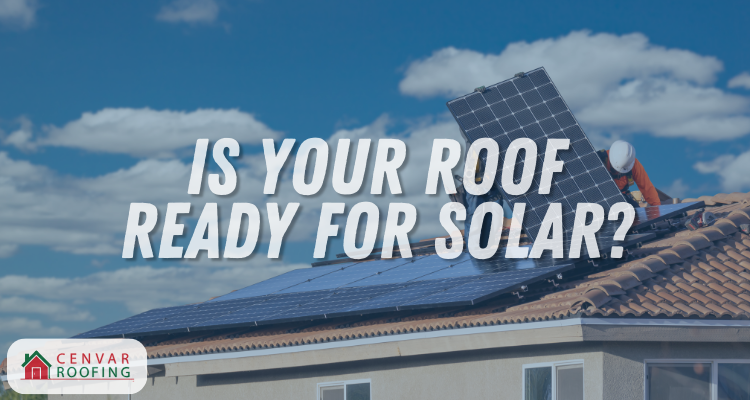- 1-905-452-8193
- Contact Us
- Member Login
- Get Listed Today
- 220,911 members

Solar energy can be a game-changer for homeowners looking for a green and money-saving energy option. But, before you dive into installing solar panels, it's important to check if your roof is set to handle this eco-friendly technology.
Your roof's ability to handle solar power is a big deal and can affect how well it works, how long it lasts, and if it's a successful investment in the long run.
Is your roof ready to soak up the sun and join the movement toward a more eco-friendly future with solar energy?
Let’s answer that question.
FAQs About Solar Panels & Roofing
When it comes to the intersection of roofing and solar panels, homeowners usually find themselves with more questions than answers.
Can solar panels be installed on any type of roof?
Are solar panels compatible with shingle roofs?
Are metal roofs suitable for solar panel installation?
What is the best type of roof for solar?
Solar panels are generally considered safe for your roof, but it does help to understand precisely what the process entails and know what to be aware of during installation.
The First Step to Going Solar: Roof Inspection
A roof inspection will examine both the interior and exterior of your home. This important first step will also give you an estimate of your roof's age and determine what needs to be fixed, replaced, upgraded, or stabilized before any other work is done.
For optimal performance and longevity, industry manufacturers recommend replacing a roof that is older than ten years before installing solar panels.
Solar Panels on Shingle Roofs
Although solar panels are completely suitable for shingle roofs, if your shingle roof is older than 30 years and you're thinking about adding solar panels, it's advisable to replace the roof first.
A properly maintained shingle roof has a lifespan of 20-30 years, and solar panels usually come with a 25-year warranty. Therefore, replacing a roof older than ten years before installing solar ensures a longer and more efficient lifespan for both the roof and the solar energy system.
Solar Panels on Metal Roofs
Metal roofs are a great option for homeowners looking to take advantage of solar energy.
Roofing experts and solar installers often suggest metal roofs because they work really well with solar panels, and have special qualities that make them a good fit for solar installations.
With standing seam metal roofs, installing solar panels becomes even more straightforward. This is because instead of penetrating the roof to attach the panels, the solar bars attach to the seams of the metal roof with what is called an S-5 clamp.
For corrugated metal roofs, the installation process differs slightly. Solar panels are typically mounted using brackets equipped with fasteners that secure them to the corrugated metal panels.
You should always consult with your solar representative about how they plan to attach the solar panels to your specific type of metal roof.
What Type of Roof is Best for Solar Panels?
When it comes to the best roof for solar panels, there are a few options to consider.
Generally speaking, asphalt, tile, and tar and gravel roofs are regarded as good choices, while metal roofs are often considered the best roofing materials for solar. In particular, a standing seam metal roof is always best as this system avoids penetrating the roofing material on your home.
Another advantage of metal roofs is their strength, allowing them to support the weight of solar panels, mounting racks, and associated hardware. This sturdiness eliminates concerns about the structural integrity of the roof and ensures a secure installation.
The smooth surface of metal roofing provides a streamlined platform for the panels, optimizing the efficiency of sunlight absorption. Metal roofs are also known for their durability and longevity, which complements the long-term nature of solar investments.
By combining the durability of metal roofs with the energy-generating potential of solar panels, you can create a sustainable and efficient power system for your home.
Does Roof Design Matter With Solar Panels?
South-facing roofs offer the best solar performance, capturing the maximum sunlight throughout the day and generating more energy. If your home faces east or west, solar panels can still work efficiently, though their performance may be slightly less optimal.
Another important factor is the pitch of the roof, which should be around 30 degrees. This angle is considered ideal for solar panel installations because it strikes a good balance between capturing sunlight efficiently and facilitating self-cleaning.
It is also recommended to have a roof area of at least 480 square feet to accommodate a sufficient number of panels for generating a significant amount of electricity.
By considering factors like roofing material, orientation, pitch, and size, you can identify the right combination that will optimize energy production and enhance the overall effectiveness of your investment.
Other Items to Consider When Installing Solar on Your Roof
When considering solar panels, it's natural to have questions about warranties, savings, and maintenance. Here are key points to consider:
Warranty Information
Incentives for Solar Installation
Financial Benefits of Solar
Warranty for Roof Penetrations
Panel Cleaning Frequency
Roof Strengthening Requirements
Exploring Non-Drilling Options
Enlisting the help of a licensed and certified roofing contractor is the most reliable way to guarantee that your roof is ready for solar.
|
|
